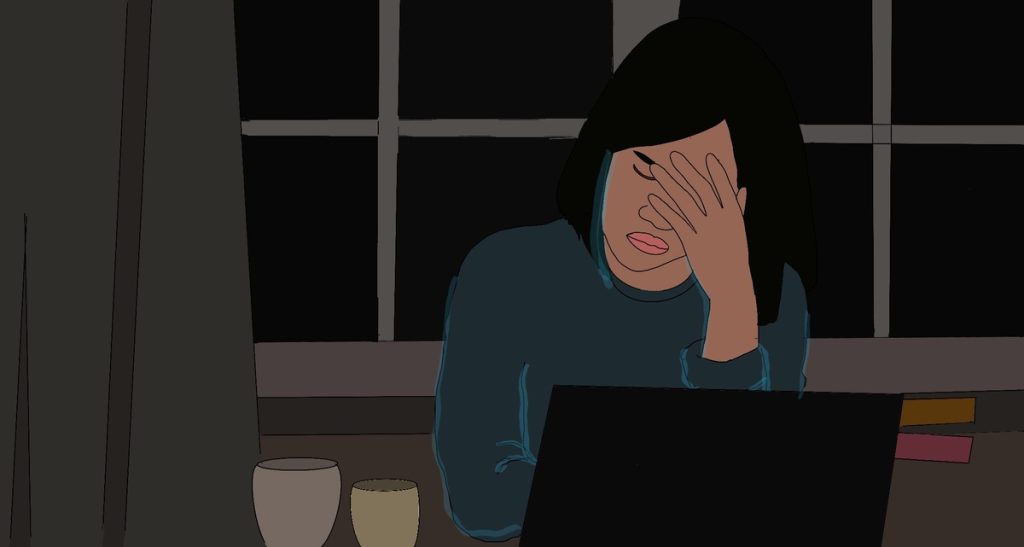Are you sick of the daily grind? The hard work, the pull-up-your-bootstraps mentality of the present-day meritocracy has created a mythology that success means overworking oneself, avoiding sleep, and becoming a machine of non-stop productivity.
But the reality is that you inevitably put in so much work, churning out paper after paper, or doing more and more for your boss, but you aren’t rewarded on par with the efforts you put in. Burnout develops from the unrelenting stress that forms when you are running on empty.
It can be easy to confuse burnout with general stress or even depression. While these diagnoses aren’t unrelated, burnout is the feeling one gets from being completely drained, when a person can’t do any more work, and their projects drum up feelings of dread.
In May 2019, the World Health Organization declared burnout an, “occupational phenomenon,” and described it as, “a syndrome conceptualized as resulting from chronic workplace stress that has not been successfully managed.” WHO characterizes burnout as having three dimensions:
1. Energy Depletion or Exhaustion
2. Mental distance or cynicism related to work
3. Reduced professional Efficacy
While burnout is directly connected to the workplace, as a student, it is important to remind yourself that academia is a job that requires similar skill management, networking, and deadlines. Being a student is a real job!
One way to quickly notice burnout is if you have forgotten why you work or study in the first place. One works or studies so that they can have a more well-rounded and enjoyable life outside of school or the workplace; if that personal time is sacrificed for the sake of a job or school, then a person feels more a machine than a human.
Coping with Burnout
First off, tell yourself that IT IS OK for you to feel burnout at any time. More importantly, in the borderline-apocalyptic year that was 2020, everyone felt burnout. This has been the year of doing the same thing…everyday… in and out… surrounded by the same people, the same grey-paint walls… day after day.
You get the point.
Give yourself a break!
This is truly the best solution and only immediate remedy. Figure out the things that are best for yourself mentally and do those things. Then don’t let your soul become a second priority in the future. Care for your mental well-being and you’ll be rewarded in the long run.
Replenish your energy. Drink a smoothie. Have a nap. Meditate or journal. It might all sound cliché, but sometimes what one truly needs is to just breathe and relax.
Message your professor and ask for an extension or a break. They are here to help you, and for the most part they are understanding and cooperative.
Organize yourself! This is the hard part. As a student, end-of-term deadlines are inevitable. You can make the work easier by taking this approach:
1. Take half an hour to write out a list of all your remaining projects and tasks, no matter how small. Use sticky notes or a project management app like Notion or Trello and create a card for each task.
2. Organize your projects by due dates.
3. Then based on the remaining days of the term, distribute time to each of your projects, whether it be 15 minutes or a couple of days. Keep in mind the assignments graded-weight and required work when distributing time.
4. Squeeze in a bubble for self-care. After your organization work is done, but before you start any projects, give yourself a short break. Designate at least one night and, if you have the luxury, take a whole weekend. Enjoy a bubble bath, play a video game, do whatever – as long as it sparks joy.
Preventing Burnout
After this term is complete, make a promise that you will take better care of yourself and avoid falling into a burnout rut in the first place.
Here are some tips to prevent burnout:
1. Get eight hours of sleep a night.
2. Eat healthier. A green smoothie is always a good choice.
3. Always schedule yourself personal time.
4. Embrace spontaneity over repetition.
5. Reward yourself for doing well.
Now, I’m no expert on avoiding stress. I often fall prey to the same trappings of routine and unhealthy behaviour. I’m creating this guide, in a way, to help myself by writing a healthy dose of much needed self-advice that will help my sprint towards the finish line.
If nothing helps and the negative feelings seem unavoidable, perhaps it isn’t burnout but depression or anxiety that you are feeling. There is no shame in reaching out for mental health support. Get that shit off your chest! UNB and STU both offer mental health services for students.
Also, consider that there is a chance that your current faculty or major is not what you actually want to be doing. Talk to your academic advisor about different major options, or, if you need to, take some time off school to reprioritize and give yourself the breathing room you deserve. Life is about making do in our own ways, so permit yourself to live on your terms.




